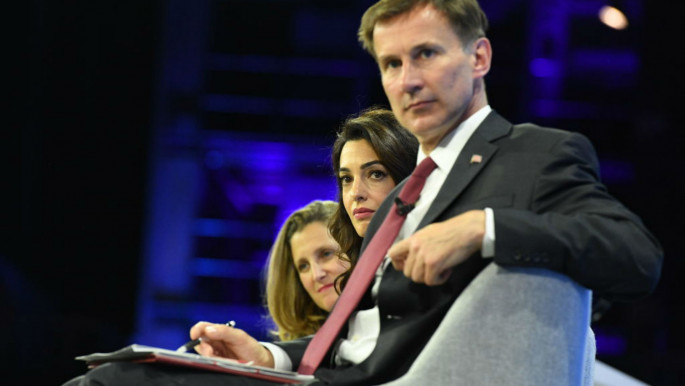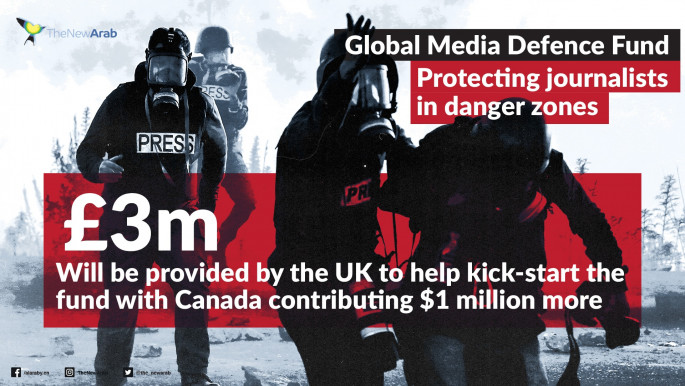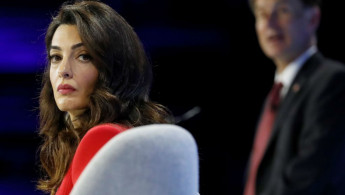Khashoggi's murder took global media freedom to rock bottom, but journalists are fighting back
This, he declares, is an act of "censorship" by the "conference police". There appeared to be little interest from the event organisers when Levant scrawled the message on the wall, which has been set aside for the purpose of free artistic expression, even if it's used to defend a far-right propagandist.
Censorship
Many of the journalists at the conference face very real dangers at home, from governments or powerful mafias, such as Myanmar journalist Sonny Swe who spent eight years behind bars for criticising the previous military junta. Others had seen colleagues killed or family members threatened due to their reporting on corrupt governments and criminal gangs.
One journalist who paid the ultimate price for his writing was Jamal Khashoggi, who was brutally murdered inside the Saudi consulate in Istanbul last October. His name is evoked in almost every talk and debate at the summit. Khashoggi has come to symbolise the fragility of media freedom today, when the UK's political allies get away with butchering government critics in diplomatic missions in Europe. Or when the US president can publically denounce a journalist as an "enemy of the people".
It is dangerous language in a world when nearly a hundred media workers were killed just last year. In Mexico, the situation is even more perilious with one brave reporter killed every month on average this year.
The conference has also shown that there are people tirelessly defending the rights of journalists and fighting for justice for those who have died. One is Agnes Callamard, UN Special Rapporteur on extrajudicial, summary and arbitrary executions, who is investigating the murder of Jamal Khashoggi.
 |
This is why I am putting the onus on others, [but] I am not going to waste my time with Donald Trump and MbS - Agnes Callamard, UN Special Rapporteur on extrajudicial, summary and arbitrary executions |
 |
She spoke on a panel alongside Mathew Caruena, the son of murdered Maltese journalist Daphne Caruana Galizia, on Wednesday at a discussion on 'innovation to end journalist murders'. "We have to stop the bullies," she concluded.
When moderator, Leon Williams, director of Free Press Unlimited, said that perhaps the UK and Canada are attempting this with the Defend Media Freedom conference, Callamard stressed that good words and pledges are not enough.
"We will see about after [the conference]. I think it is too early to decide whether this will deliver, whether it will be a courageous stance… I am past calling for hope, we need courage, we need people to stand up for Jamal Khashoggi, for his mother, for all the journalists of this world… that is what is lacking," she proclaimed, to rapturous applause.
Empowering tyrants
Last month's G20 summit in Tokyo provided the perfect opportunity for countries such as the UK, Germany and Canada to call out Saudi Arabia's Mohammed bin Salman - also known as MbS - on his alleged role in the murder of Khashoggi.
 |
| Freeland, Clooney and Hunt are taking note of abuses against journalists [Getty] |
This would have sent a powerful message to other world leaders that killing critics will not be tolerated, Callamard said. They missed an open goal.
"The problem now is not the fact there are violators and bullies [out there] - we've always had that in the international system - the problem is that there are people not daring to speak out. That is where the difference [today]," Callamard told me on the side-lines of the conference.
"Ten years ago there would have been countries, heads of state… political leaders ready to take a stand for press freedom and make it public. Right now none of those people are courageous enough, including during the G20 summit. [They failed to] say 'I'm sorry, I do not agree with giving MbS, and others, an opportunity to showcase their violations with complete impunity'."
Winds of change
The G20 summit was symptomatic of the many political changes the world has experienced in recent years with populist leaders American President Donald Trump, Brazilian President Jair Bolsonaro, Russian President Vladimir Putin and Saudi Crown Prince Mohammed bin Salman all in attendance.
Although UK Prime Minister Theresa May and German Chancellor Angela Merkel brought up the issue of Khashoggi's murder, Trump appeared oblivious to the journalist's torture and murder. He was seen warmly greeting the crown prince and patting him on the shoulders with paternal affection as the cameras rolled.
It was not the cold shoulder many Democratic and even fellow Republicans wanted the president to show the crown prince over the murder of Khashoggi, who was well-known and well-liked in Washington.
After several months investigating the murder of Khashoggi, Callamard was hardly surprised by Trump's response at the G20 summit, given that he has repeatedly failed to act on intelligence presented to him that allegedly shows a clear link between the crown prince and Khashoggi's murder. She appeared more disheartened by the lack of action from other European and North American leaders who claim to be fighting for media freedom.
"This is why I am putting the onus on others, I am not going to waste my time with Donald Trump and MbS… my problem are the silent 18 (leaders) in the G20 and the silent majority at the moment, this is where the solution is," she said.
If the problem lies in the strong support Trump continues to show the Saudi crown prince - while other heads of state at best meekly tick-off Riyadh - could a Democrat winning next year's US presidential elections make a difference?
"It will make a big difference, but it doesn't mean the others should just wait. The change in US administration, I think, will make a big difference because Mr. Trump gives a handshake to MbS in such a way that is empowering all the violators around the world and tells them 'please continue, you have our support'. I hope this will change with a change of government."
 |
Hopes and fears
One of the most high-profile names at the conference was human rights lawyer Amal Clooney, whose words on Khashoggi's slaying made the news across the world. "Journalists are under attack life never before" she warned the conference and the vast majority of media workers "go unpunished".
"World leaders responded with little more than a collective shrug," to Khashoggi's killing, she said.
When the US president declares critical reporting as "fake news" and more people increasingly get their "facts" from social media - including Trump's Twitter page - and not from professional newsgatherers, then the world appears to be a very bleak place for journalists.
"Today, the country of [former president] James Madison has a leader who vilifies the media, making honest journalists all over the world more vulnerable to abuse," Clooney said, taking a swipe at Trump.
"With authoritarianism, isolationism and nationalism gaining ground, the relevance of international institutions and respect for international norms are seriously in question."
The Defend Media Freedom conference concluded on the first day with an announcement that a summit will be held every year, the creator of the event British Foreign Minister Jeremy Hunt said.
Hunt and his Canadian counterpart, Chrystia Freeland, pledged to meet annually and evaluate the status of media in the world and when applicable, remedy it. Hunt also declared a number of measures to assist journalists, including £3 million from the UK and £1 million from Canada to establish a Global Media Defence Fund to help train and protect journalists.
This could send a powerful message to journalists across the world that the UK and Canada supports them. Without a strong response from governments to those who kill reporters - especially world leaders - then the achievements of the summit will prove very easy to erase.


![President Pezeshkian has denounced Israel's attacks on Lebanon [Getty]](/sites/default/files/styles/image_684x385/public/2173482924.jpeg?h=a5f2f23a&itok=q3evVtko)



 Follow the Middle East's top stories in English at The New Arab on Google News
Follow the Middle East's top stories in English at The New Arab on Google News


